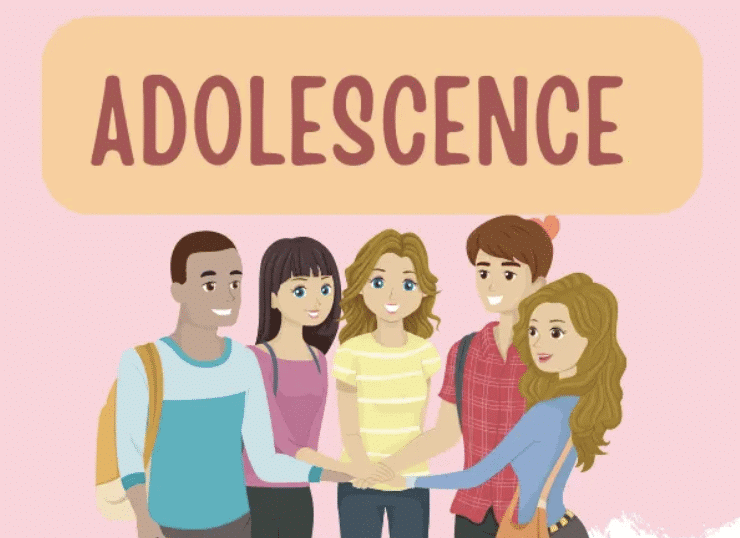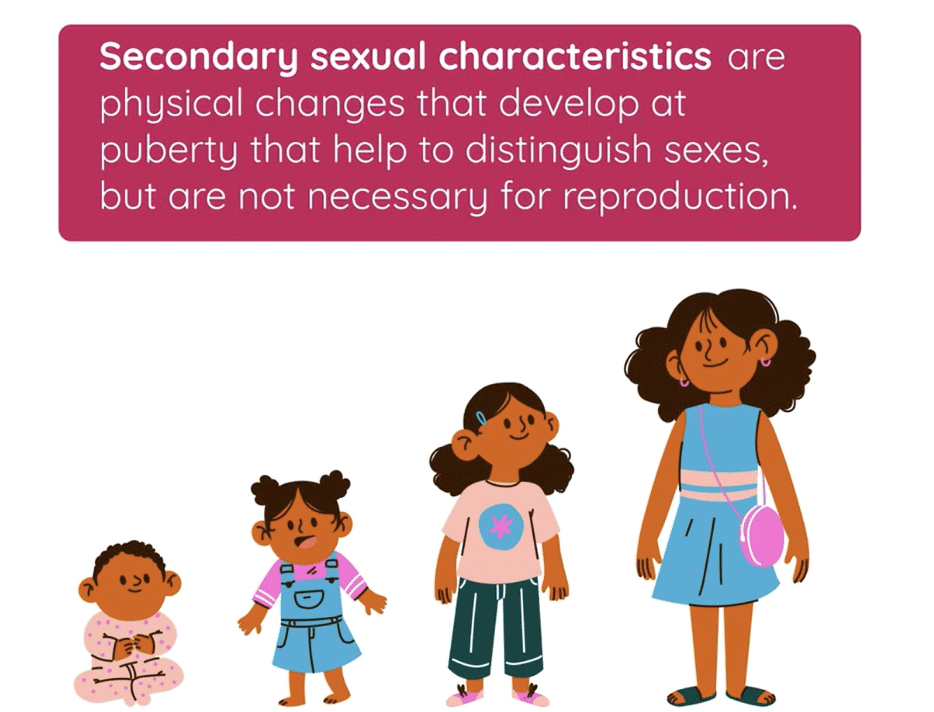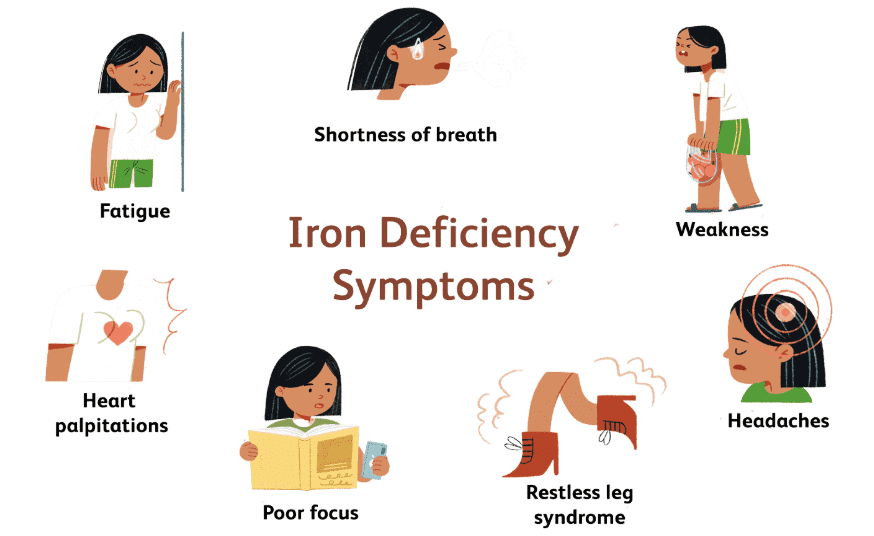Adolescence: A Stage of Growth and Change Class 7 Notes Science Chapter 6 Free PDF
Introduction
- The life of a plant starts from a tiny seed. With proper care, it grows into a sapling and then a mature plant, which can produce flowers, fruits, and new seeds. But it takes time for a plant to grow before it can make seeds again.
- Similarly, animals and humans also grow and change before they can reproduce. Some animals lay eggs, while others give birth to young ones. These young ones grow slowly and develop over time.
- In humans, life moves through different stages: infancy, childhood, adolescence, adulthood, and old age. Between ages 10 to 19, we go through adolescence, a time of fast physical, emotional, and mental growth. During this stage, the body begins to prepare for adulthood and reproduction.
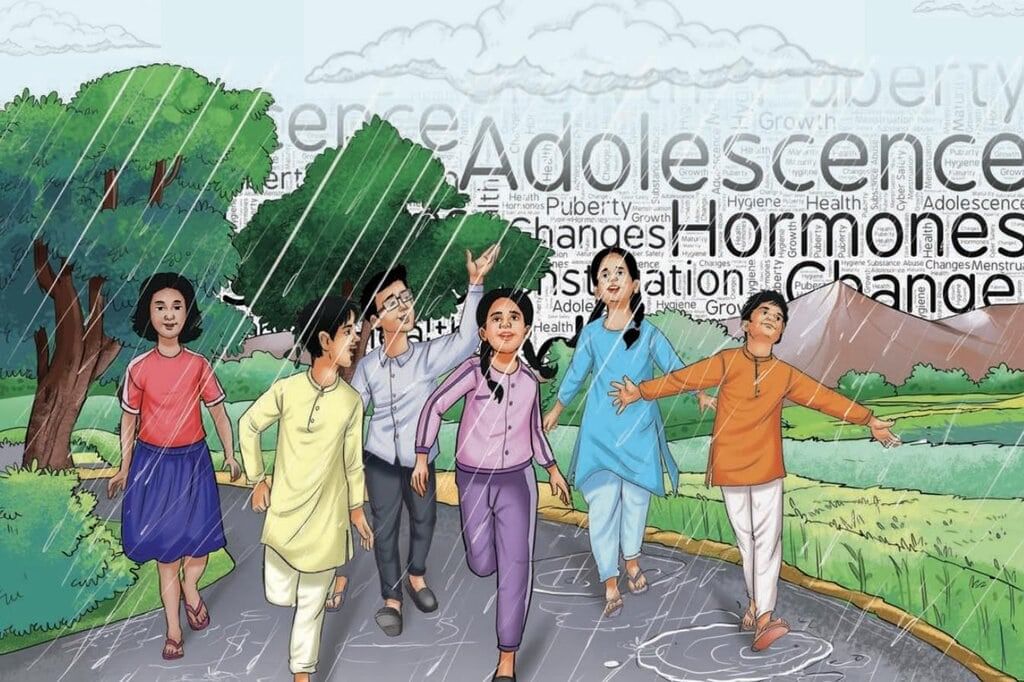
Let’s explore the changes that happen during adolescence and learn how to handle them responsibly.
Growing with Age: The Teenage Years
What is Adolescence?
Adolescence is the transitional stage between childhood and adulthood, starting around age 10 and lasting until age 19, characterized by rapid physical and other changes.
Changes During Adolescence
As children grow into teenagers, their bodies and minds go through many physical and emotional changes. These changes are natural and happen at different times for different people.
Here are some common changes:
1. Increase in Height and Body Shape
Boys and girls grow taller quickly.
Boys may gain weight, have broader shoulders, and wider chests.
Girls may notice breast development and body shape changes.
2. Change in Voice
Boys’ voices become deeper due to the growing voice box (also called the Adam’s apple).
Girls may also experience slight changes in their voice.
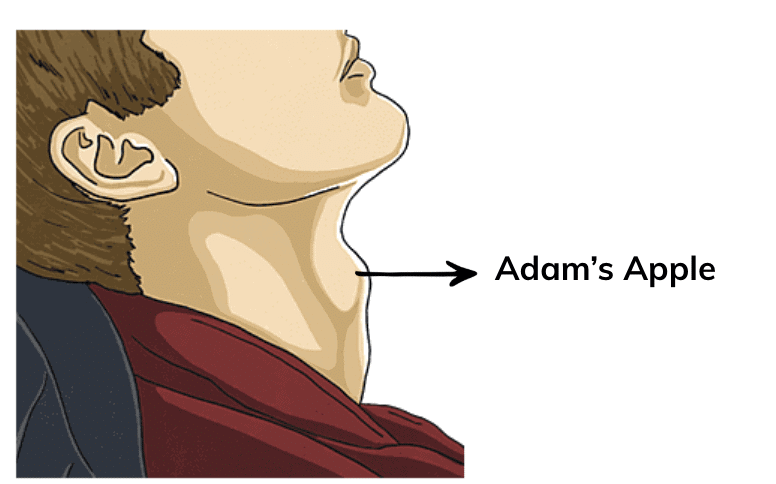
3. Hair Growth
Hair begins to grow in the armpits and pubic area in both boys and girls.
Boys also develop facial hair like a moustache or beard, and sometimes chest or back hair.
The amount and timing of hair growth vary from person to person.
4. Changes in Skin
Many teens get pimples or acne because of oily skin during this time.
Acne is common and happens when oil blocks skin pores.
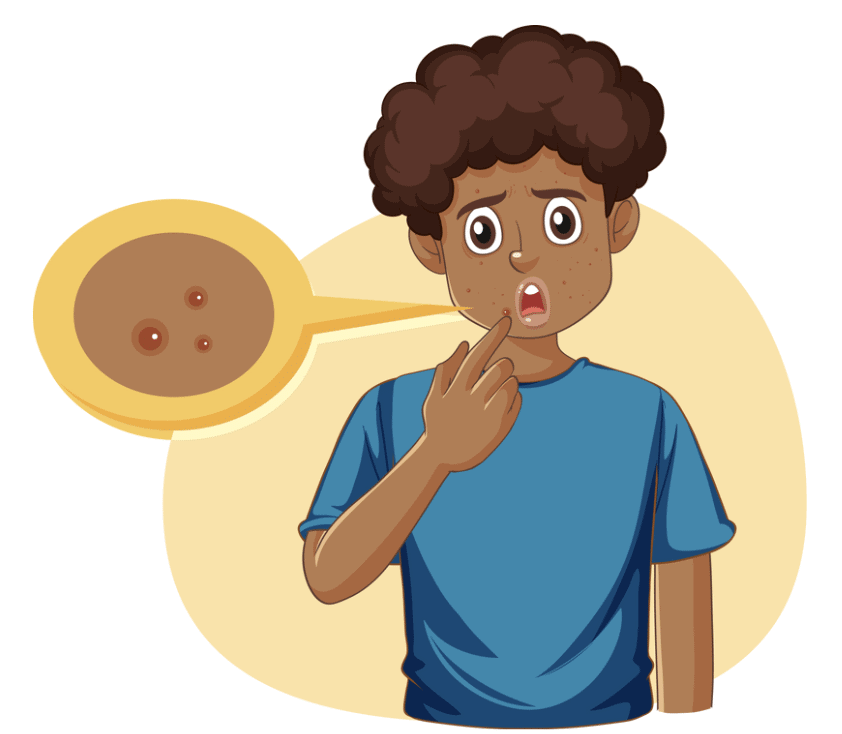
A Key Point to Remember
Everyone goes through these changes at their own pace.
Some may grow faster or slower, and that’s completely normal.
These changes are part of growing up.
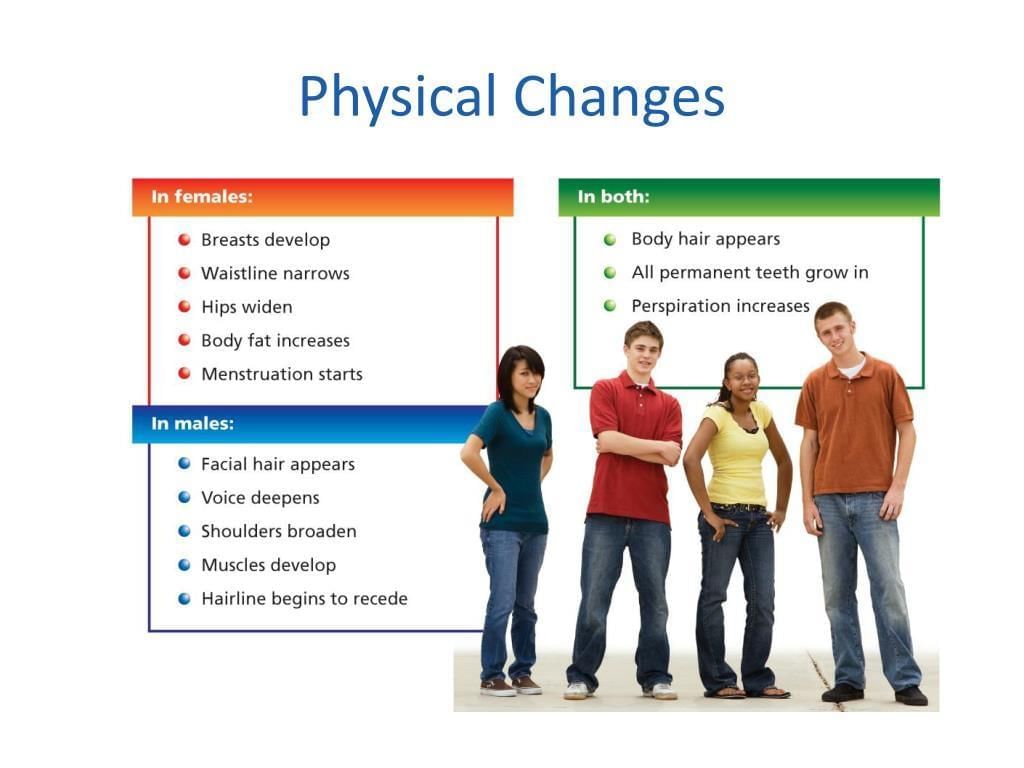
Secondary Sexual Characteristics
Certain changes, like voice deepening in boys, facial and chest hair growth in boys, and breast development in girls, are called secondary sexual characteristics.
- These characteristics distinguish males from females but are not directly involved in reproduction.
- They signal the onset of puberty, the stage where the body prepares for adulthood and reproductive capability.
What is Puberty?
Puberty is the stage when both external and internal changes prepare the body for reproduction. It marks the beginning of adolescence and the path toward becoming an adult.
Changes that Indicate Reproductive Capability
Adolescence brings not just visible changes like height or voice, but also important internal changes — especially those related to reproduction.
Menstrual Cycle in Girls:
The menstrual cycle, commonly called “the period,” is a natural process in adolescent girls, marking reproductive maturity.
It usually occurs every 28–30 days, but it can vary between 21–35 days.
The time when blood flows out from the body is called menstruation and it lasts for 3 to 7 days.
Some girls may feel pain or discomfort in the lower belly during this time.
Menstruation is a normal and healthy sign of reproductive growth.
It naturally stops between the ages of 45–55, marking the end of a woman's ability to reproduce.
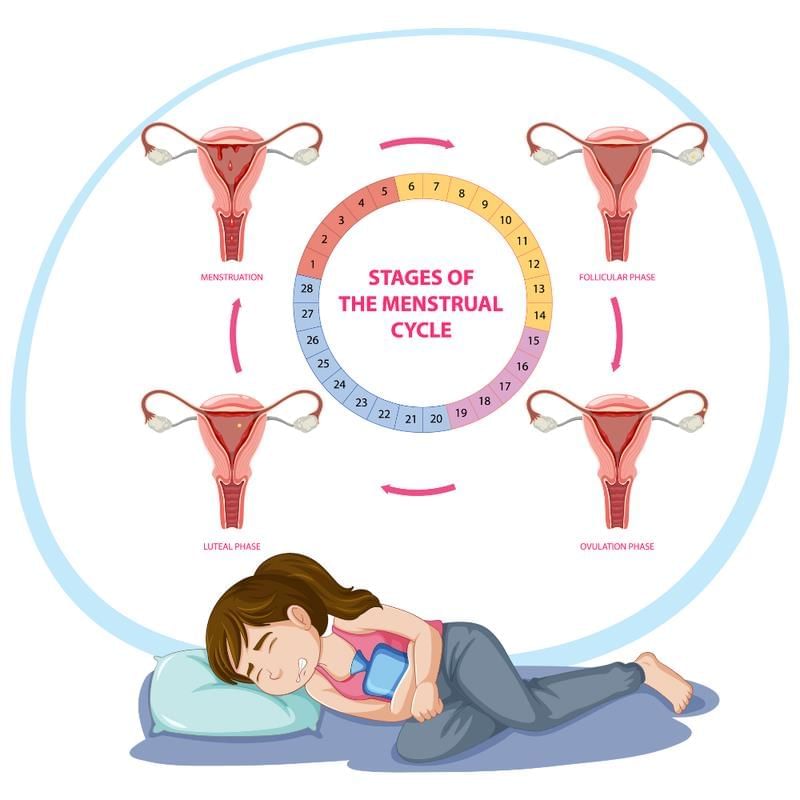 Menstrual Cycle
Menstrual Cycle
Breaking Myths About Menstruation
In many places, there are wrong beliefs and taboos about periods.
Some believe girls should stay isolated during menstruation — this is not correct.
Menstruation is natural and healthy, and there’s no need for shame or fear.
Understanding it with a scientific outlook helps support women’s health and removes unnecessary taboos.
Emotional and Behavioral Changes in Adolescents
Adolescence is not only a time of physical growth — it’s also a time of strong emotions and changes in behaviour. These changes can feel exciting, confusing, or even overwhelming, but they are a normal part of growing up.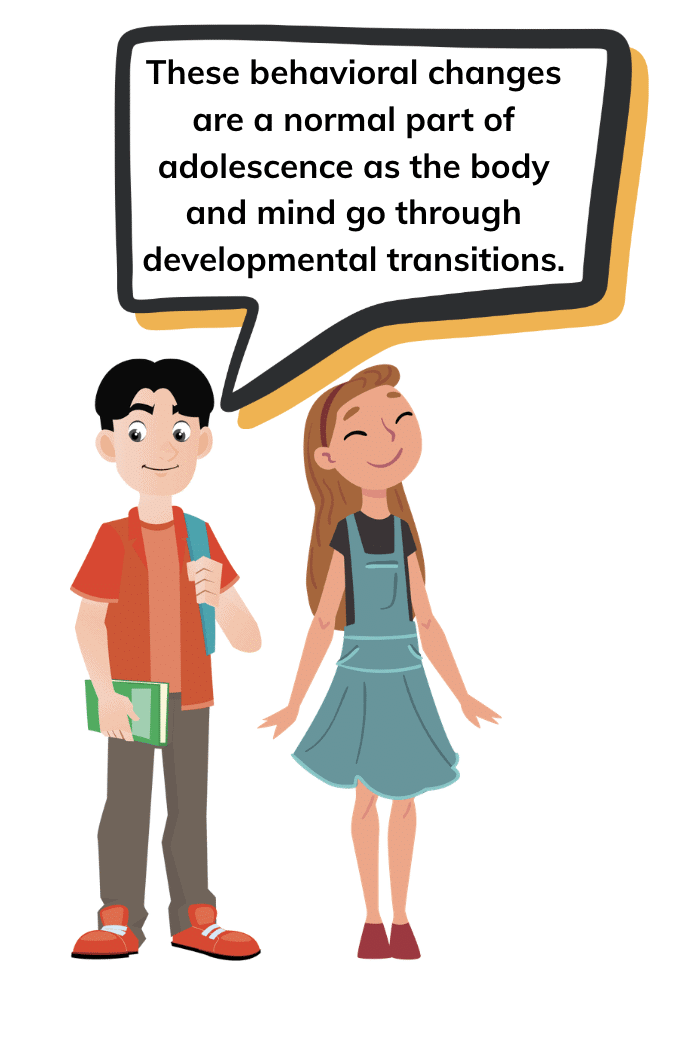
Let’s understand some common emotional changes and how they affect behaviour — along with ways to handle them positively.
Emotional Changes, Behaviour, and Positive Growth
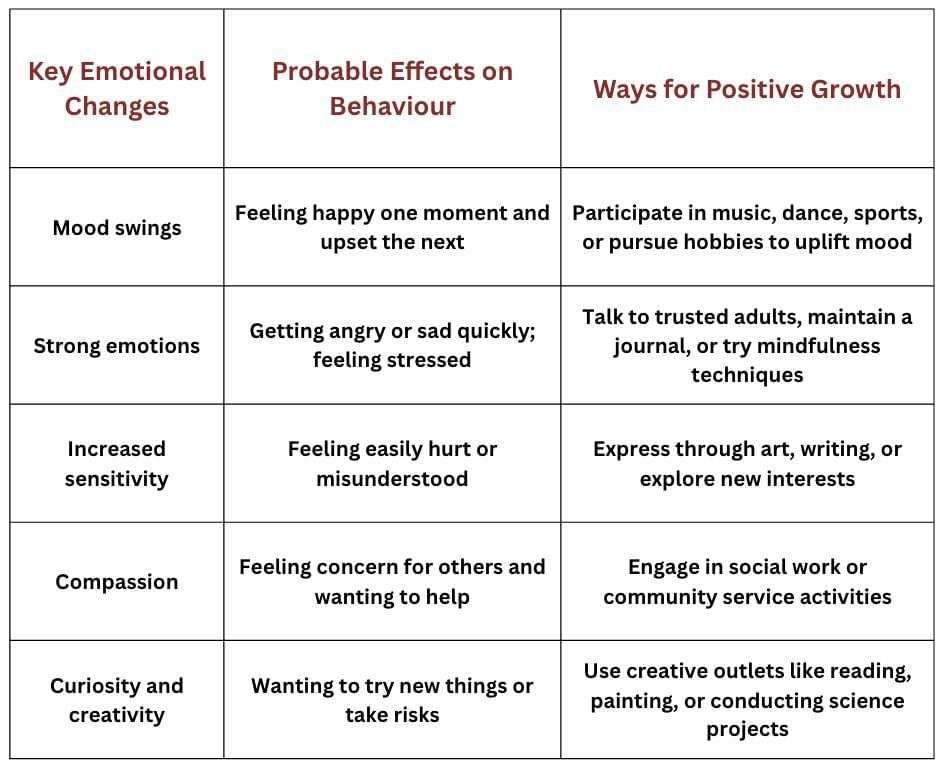
Understanding and Managing Emotions
Adolescents often feel emotions more strongly than children.
These emotions can lead to new interests, such as helping others or exploring creative hobbies.
By understanding your feelings, you can make thoughtful choices and respond to situations in a healthy and balanced way.
Making Adolescence a Joyful Experience
Adolescence is a special journey filled with curiosity, energy, and new experiences. To make this stage happy and healthy, it's important to take care of your body and mind. Good habits, smart choices, and staying positive can make a big difference!
Meeting Nutritional Needs
Adolescence requires a nutritious diet to support rapid growth and development.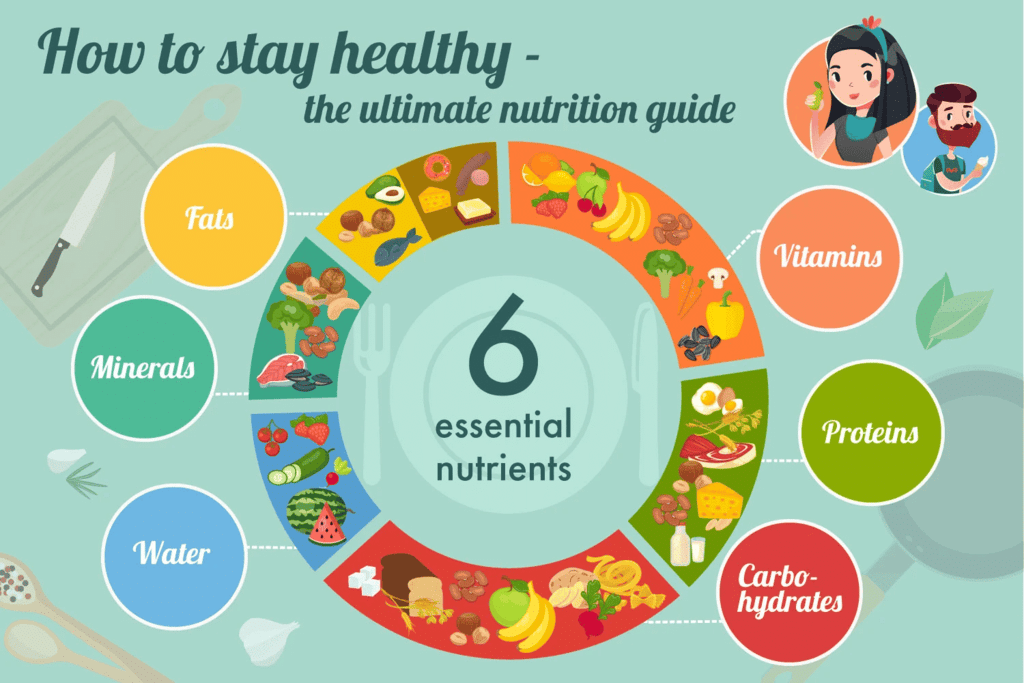
Nutrients Needed
- Proteins and Carbohydrates: Essential for growth, strength, and energy, found in foods like milk, millets, and curd.
- Calcium: Supports bone growth, found in milk, cheese, and paneer.
- Iron: Aids blood formation, found in spinach, kidney beans, and dried fruits like raisins.
- Fats, Vitamins, Minerals: Needed in adequate amounts for overall health.
- Health Concerns: Adolescents, especially girls, may face blood-related issues due to iron or vitamin B12 deficiency, which can be managed with a balanced diet.
Science and Society: Iron Deficiency in Adolescents
Many adolescents, especially girls, may suffer from iron deficiency. This can lead to tiredness, weakness, or even anaemia (a blood-related health problem).
To prevent this:
Eat iron-rich foods like spinach, jaggery, lentils, and dried fruits
Include vitamin C (like oranges or amla) with iron-rich foods to help absorb iron better
Government programs like Iron and Folic Acid (IFA) supplementation provide free tablets in many schools
Know a Scientist: Dorothy Hodgkin
Dorothy Hodgkin was a great chemist who studied vitamin B12, which is needed for a healthy body and blood.
She won the Nobel Prize in Chemistry in 1964.
Our body can’t make vitamin B12, so we must get it from food like dairy, eggs, and meat.
Talk to your teacher or family to know more about foods rich in B12!
Personal Hygiene
Along with eating healthy food, personal hygiene is essential during adolescence.
During this stage, your body goes through many changes.
Keeping your body clean, especially in the armpits and pubic area, helps prevent infections.
Menstrual Hygiene for Girls
Girls should take extra care of hygiene during menstruation (periods).
Use sanitary pads or reusable cloth pads to stay clean and comfortable.
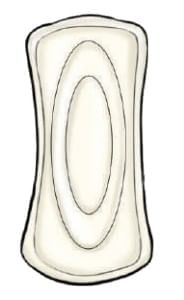
Dispose of used pads properly: wrap them in newspaper and throw them in a covered dustbin.
Today, biodegradable sanitary pads are also available, which are safe for the environment.
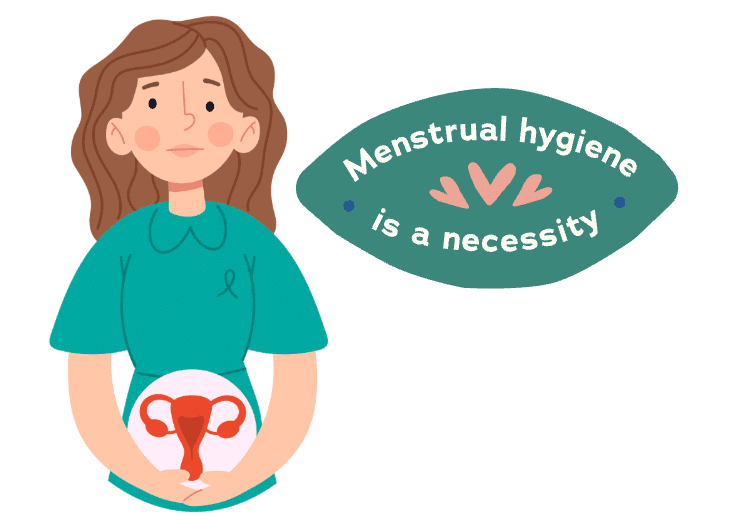
Breaking the Stigma
Menstruation is natural, and there is no need for shame.
Society must:
Provide clean toilets and safe spaces in schools and public places.
Help make sanitary products easily available.
Talk openly about menstrual hygiene to support girls and women.
Science and Society: Government Support for Menstrual Hygiene
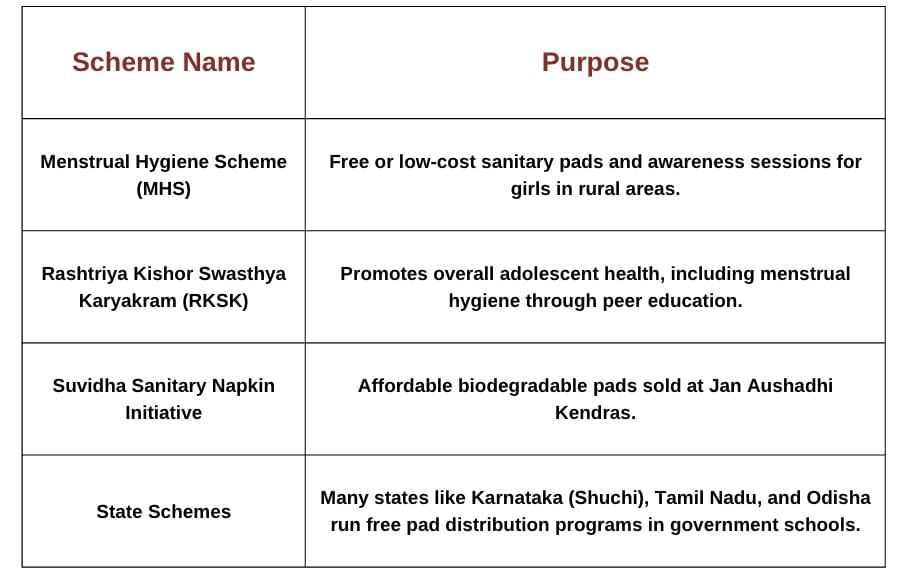
Physical Activities & Social Life
- Benefits: Regular exercise, games, and sports keep the body and mind fit, build stamina, and boost mood.
- Examples: Activities like running, cycling, or team sports promote overall health.
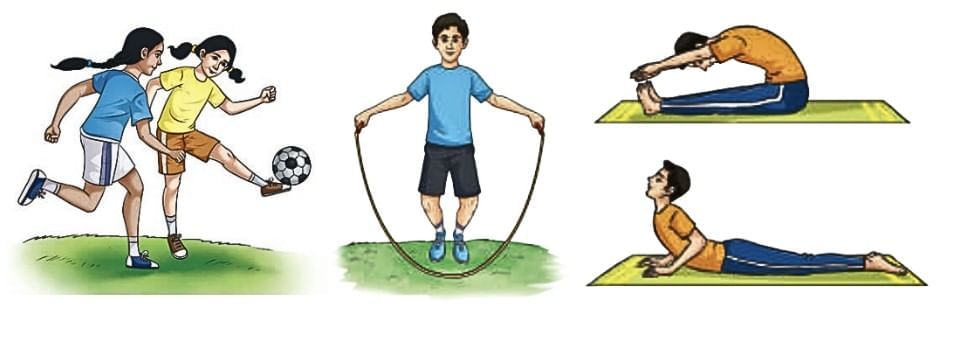
- Importance: Physical activity supports growth, reduces stress, and enhances well-being during adolescence.
Balanced Social Life
We all live together in society and interact with many people every day. Being polite and respectful helps create a friendly and safe environment for everyone.
Adolescence and Social Interaction
Adolescence brings new feelings and experiences.
Teens may feel attracted to their friends and often copy their behavior.
Many now interact online through social media and messaging apps.
Using Technology Responsibly
Technology lets us connect, learn, and share information easily.
It’s important to use social media carefully and responsibly.
Sometimes, people may use social media carelessly or hurt others without meaning to.
If you face cyberbullying (mean messages, rumors, sharing private info), don’t be scared — tell your parents or teachers right away.
Dos and don’ts to be followed on social media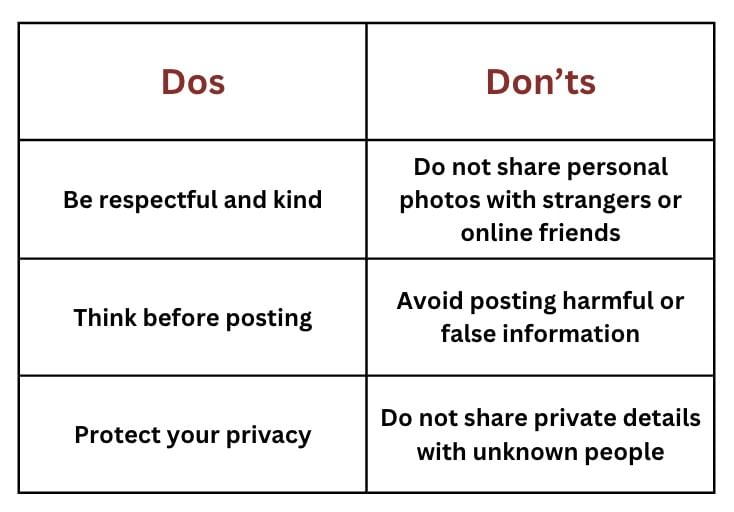
Science and Society: Cyberbullying
Cyberbullying means using phones or computers to hurt others by sending mean messages or sharing private info without permission. It is important to stay safe and seek help if you face it.
Avoiding Harmful Substances
During adolescence, some people may try to pressure you to use harmful substances like tobacco, cigarettes, alcohol, or illegal drugs. Because of curiosity and excitement, teens might be tempted to try them.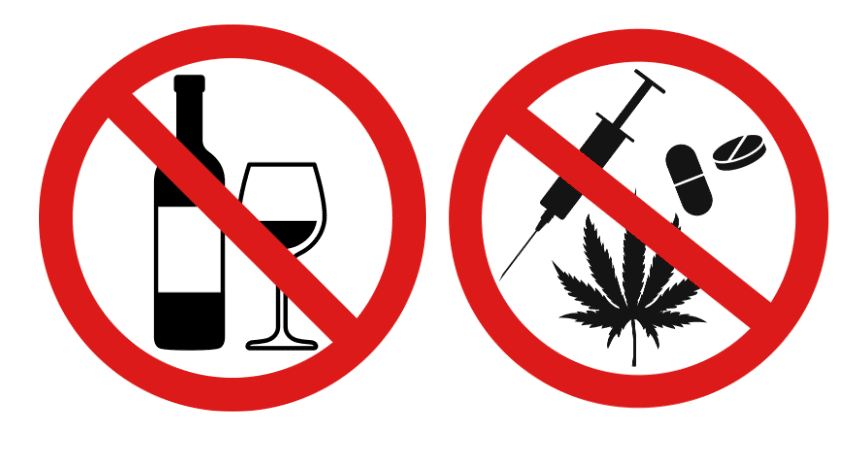
Why Avoid These Substances?
They are harmful to your body and mind.
They are addictive, meaning once you start, you might want to keep using them again and again.
This addiction is called substance abuse.
Using these substances can cause serious health problems like lung damage, breathing difficulties, and memory loss.
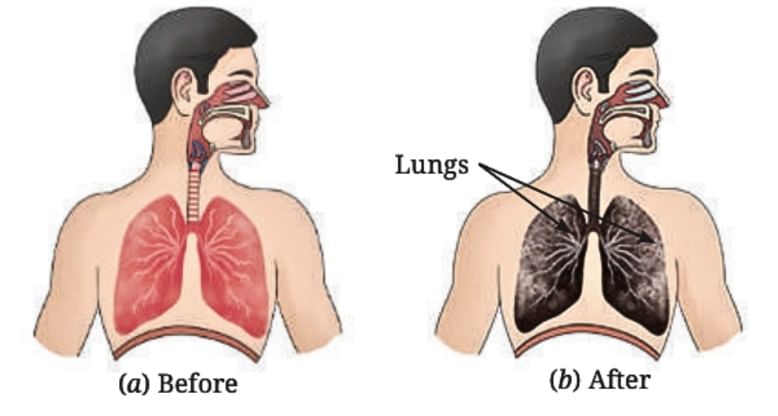 Condition of the lungs before and after prolonged exposure to bidi/cigarette smoke
Condition of the lungs before and after prolonged exposure to bidi/cigarette smoke
Be Strong and Say NO!
Say NO the very first time and every time someone offers these substances.
Remember, people who are addicted often started with just one try.
Choose healthy habits instead.
If you or someone you know is struggling, talk to trusted adults like parents or teachers for support.
Counselling and medical help are available and important.
Science and Society: Nasha Mukt Bharat Abhiyaan
This is a government campaign to raise awareness about avoiding substance abuse.
It focuses on preventing addiction, especially among children and youth.
A National De-addiction Helpline (14446) is available for help with drug addiction.
The ‘Why’ Question for Adolescence
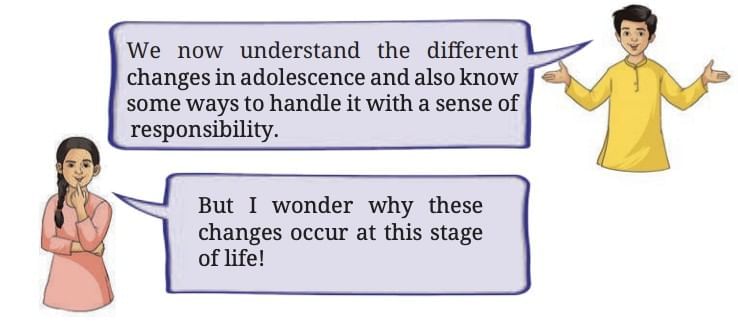
Adolescence involves many physical and emotional changes.
These changes occur mainly due to hormones, which are chemical messengers produced in the body.
Hormones regulate growth, development, and various body functions.
They are released at specific times based on signals from the brain.
Some hormones also influence mood and behavior during adolescence.
Understanding these changes, seeking guidance when needed, and making healthy choices help build a strong foundation for life.
Points to Remember
Adolescence is the stage from about 10 to 19 years when a child grows into an adult.
Physical changes include getting taller, gaining weight, and developing features like facial hair in boys and breasts in girls.
Puberty prepares the body for having babies, and girls start their menstrual cycle (period) every 3–4 weeks.
Menstruation is natural, and using sanitary pads helps keep girls healthy. Myths about periods are not true.
Teenagers may have mood swings and feel more sensitive, but these feelings can lead to creativity and kindness.
Eating healthy foods with protein, calcium, and iron helps growth. Lack of iron or vitamin B12 can cause health problems.
Good hygiene, especially during periods, is important to avoid infections. Governments provide help with sanitary pads.
Exercise and sports keep the body strong and the mind happy.
Use social media carefully and ask adults for help if you face problems like cyberbullying.
Avoid harmful substances like tobacco, alcohol, and drugs because they harm health and cause addiction.
Hormones cause many changes in the body and feelings during adolescence.
Learning about these changes and making good choices helps you grow up healthy and strong.
Difficult Words and Their Meanings
- Adolescence: The stage of life between childhood and adulthood (ages 10–19), marked by rapid physical, emotional, and behavioral changes.
- Puberty: The phase during adolescence when the body develops into an adult capable of reproduction, involving external and internal changes.
- Secondary Sexual Characteristics: Physical traits (e.g., facial hair in boys, breast development in girls) that distinguish males from females but are not directly involved in reproduction.
- Menstrual Cycle: A natural process in girls where blood is discharged (menstruation) every 28–30 days, signaling reproductive health.
- Menstruation: The phase of the menstrual cycle involving blood discharge, lasting 3–7 days, typically starting at puberty and ending by ages 45–55.
- Hormones: Chemicals produced in the body that regulate growth, development, mood, and functions like menstruation or puberty.
- Mood Swings: Sudden changes in emotions, common in adolescents, like feeling happy one moment and low the next.
- Personal Hygiene: Practices like keeping the body clean to prevent infections, especially important during adolescence.
- Menstrual Hygiene: Using sanitary pads or cloth pads during menstruation to stay clean and healthy, with proper disposal to protect the environment.
- Cyberbullying: Harassing others online through messages, rumors, or sharing private information, which adolescents should handle by seeking help.
- Substance Abuse: Regular use of harmful, addictive substances like tobacco, alcohol, or drugs, causing health issues like lung damage or memory loss.
- Addiction: A strong urge to repeatedly use harmful substances, making it hard to stop after starting.
FAQs on Adolescence: A Stage of Growth and Change Class 7 Notes Science Chapter 6 Free PDF
| 1. What is adolescence and why is it considered a significant stage of growth? |  |
| 2. What are the physical changes that occur during adolescence? |  |
| 3. How do emotional changes affect adolescents during this stage? |  |
| 4. What role do peers play in the life of an adolescent? |  |
| 5. How can parents support their children during adolescence? |  |


